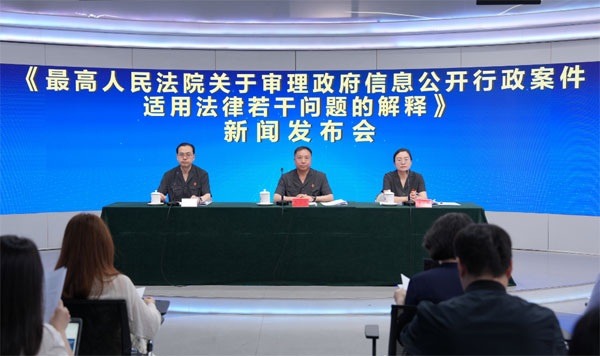SPC issues judicial interpretation concerning adjudication of government information disclosure cases
The Supreme People’s Court (SPC) held a press conference on May 20 to release the interpretation on issues concerning the application of law in the adjudication of administrative cases involving government information disclosure.

The Supreme People’s Court holds a press conference to release the interpretation on issues concerning the application of law in the adjudication of administrative cases involving government information disclosure on May 20. [Photo/court.gov.cn]
The interpretation, adopted at the 1939th meeting of the Adjudication Committee of the SPC on Dec 24, 2024, will take effect on June 1. Consisting of 15 articles, it aims to provide clearer legal guidance for handling of administrative cases concerning government information disclosure, ensuring judicial practices align with the revised Regulations on Disclosure of Government Information.
The interpretation clarifies the circumstances under which courts will accept cases related to government information disclosure, encompassing various administrative decisions such as disclosure, refusal, inability to provide, and other procedural responses. It also stipulates that applicants must seek administrative reconsideration before pursuing litigation if disclosure request thereof is denied, and addresses claims regarding incomplete disclosure or alleged violations of trade secrets and privacy.
Further, it defines the qualifications of plaintiffs in accordance with provisions in the Administrative Procedure Law, and clarifies rules for identifying defendants following the principle that those who perform the administrative act should be defendants.
The interpretation also outlines rules regarding burden of proof. Defendants are required to demonstrate the legality of their administrative acts while plaintiffs shall provide evidence of their information requests and, in cases involving sensitive information, to substantiate claims protecting trade secrets or privacy. Abuse of information requests and litigation rights is addressed by the interpretation as well.
In addition, the interpretation refines judicial procedures, including rules for rejecting cases that do not affect substantive rights, promoting timely and effective disclosure through court judgments when appropriate, and specifying conditions for confirming illegality or dismissing unfounded lawsuits.
For the protection of trade secrets and personal privacy, the interpretation maintains preventive relief mechanisms that allow courts to suspend government information disclosure based on claims of plaintiffs, recognizing the unique nature of such cases compared to general administrative litigation.
By setting these clear standards, the interpretation promotes consistent application of the law, strengthens judicial support for law-based administration, protects citizens’ lawful rights and interests, and contributes significantly to the development of law-based governance, exercise of State power, and government administration.
Geng Baojian, a member of the SPC’s Adjudication Committee and chief judge of its Administrative Division, issued the interpretation at the press conference and took questions from the media, together with Li Xiaomei, judge of the Administrative Division of the SPC. Ji Zhongbiao, deputy head of the Information Department of the SPC, presided over the conference.







